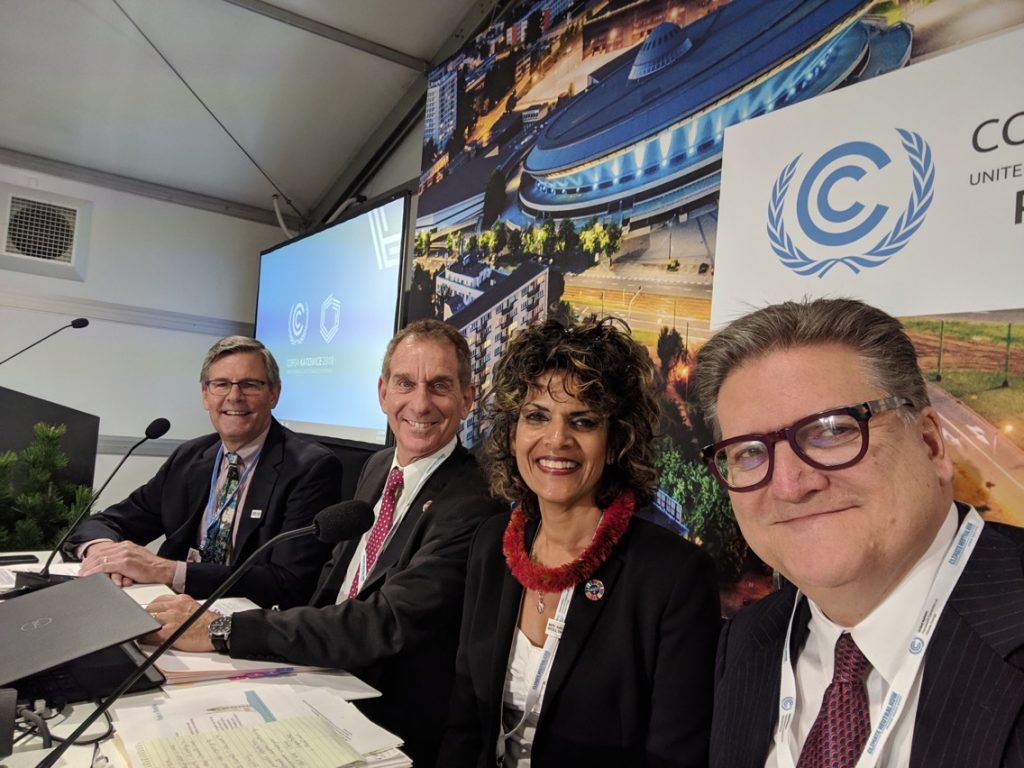Hawai‘i Participates in Climate Change Convention in Poland
The Climate Registry and the Climate Action Reserve hosted a bipartisan delegation of US states at the 24th Conference of the Parties to the United Nations Framework Convention on Climate Change in Katowice, Poland. States attending include California, Hawaiʻi, Maryland, Massachusetts and Washington.

24th Conference of
the Parties (COP24)
“We are a small state with big ambition, and we believe that big ambition leads to big action,” said Anukriti Hittle, Hawaiʻi Climate Change Mitigation and Adaptation Coordinator. “Climate change is front and center on our governor’s radar, and our Climate Change Commission – representing both executive and legislative branches of government – believes putting a price on carbon is the most effective single action that will achieve Hawaiʻi’s ambitious goals. We will continue to promote ambitious, clean, equitable and resilient strategies.”
Over the course of several events that showcased state climate action and impact, three themes emerged:
- US states are filling the climate leadership gap left by the federal government;
- US states are collaborating with each other and with other countries, cities and the business community to meet the carbon reduction targets laid out in the latest IPCC report; and,
- US states are experiencing economic transformation and growth as a result of their climate action and from clean energy and energy efficiency investments.
“Our global climate coalition and policy are too big to fail,” said Robert Hertzberg, California State Senator and Chairman of the State Senate Natural Resources and Water Committee. “The science is settled, the business interests are settled, and we will continue to build coalitions with governments around the world to advance the fight against climate change.”
“In California, we will continue to be a leader in climate action and policies, it’s part of our DNA,” said Bob Wieckowski, California State Senator, and Chair of the Senate Environmental Quality Committee. “We are committed to cutting-edge technologies and to continuing to collaborate with businesses, universities and research institutions to ensure we reduce our emissions in line with the targets identified in the IPCC report. California has shown smart climate action creates jobs, strengthens our economy, and better prepares us for the future.”
“Climate change leads to more drought, fires and floods, threatens our health and wellbeing, and poses huge risks to our economy,” said Mary Nichols, Chair, California Air Resources Board. “We want to show the rest of the world that we can reduce emissions, make our state more climate resilient, and make our economy more prosperous and equitable. We will continue to work with businesses and other governments to carry on the fight against climate change.”
“We need a federal partner that is committed to climate change. US states, cities and others are committed to doing what we can to fill that void,” said Reed Schuler, Senior Policy Advisor to Governor Jay Inslee of Washington State. “Governor Inslee co-chairs the U.S. Climate Alliance, which represents half the U.S. population and more than half of U.S. GDP, and together we have demonstrated that it is possible to reduce emissions while growing the economy at a rapid clip. We support climate action and we support our international partners in continuing to deepen that action.”
“Bipartisan environmental leadership, fueled by science and driven by urgency, is happening in Maryland and other states to deliver results when the Federal Government isn’t,” said Ben Grumbles, Maryland’s Secretary of the Environment. “Governor Larry Hogan is committed to reducing greenhouse gases, growing a cleaner and greener economy, and instilling a culture of preparedness and resiliency. The world also needs to hear that America’s Regional Greenhouse Gas Initiative, a thriving, bipartisan coalition of 9 states, is gaining ground and showing other states how to cut carbon pollution in half, while generating billions of dollars for cleaner energy and healthier communities.”
“Climate change poses a significant threat to all of us. Climate change also poses risks to insurers. As California’s insurance regulator, I required insurers to disclose their fossil fuel investments and I asked that they divest from thermal coal because of the significant risk thermal coal could become a stranded asset on the books of insurance companies as consumers, businesses, markets and governments transition away from thermal coal as a source of energy,” said California Insurance Commissioner Dave Jones. “The most recent results of our survey of U.S. insurers in California’s market show that more insurers are divesting or committing to divest some or all of their thermal coal holdings and are considering the climate-related transition risks to these investments. While there is still much more work to be done by US insurers in this regard, more are moving in the right direction. The California Department of Insurance is pleased to join the California delegation to COP 24. I strongly support California’s efforts to reduce climate change causing greenhouse gas emissions and to improve our resiliency in the face of climate change.”
“In the absence of federal action, US states have stepped up and accelerated meaningful climate action,” said Craig Ebert, President of the Climate Action Reserve. “States have enacted sensible, equitable, and economically beneficial climate policies, including raising ambitious climate targets, putting a price on carbon, investing in climate-smart infrastructure, and promoting thoughtful transportation and urban planning. States have been at the vanguard of what is possible, and of what must be done to create thriving communities and a prosperous future.”
“We have no time to waste in addressing climate change, so it’s tremendously gratifying to see that U.S. states are not backing away from the Paris Agreement commitments,” said Amy Holm, Director of Programs and Operations at The Climate Registry. “Through a variety of policy approaches such as transportation, buildings and green energy, states are showing the world that you can reduce carbon while simultaneously growing the economy.”










